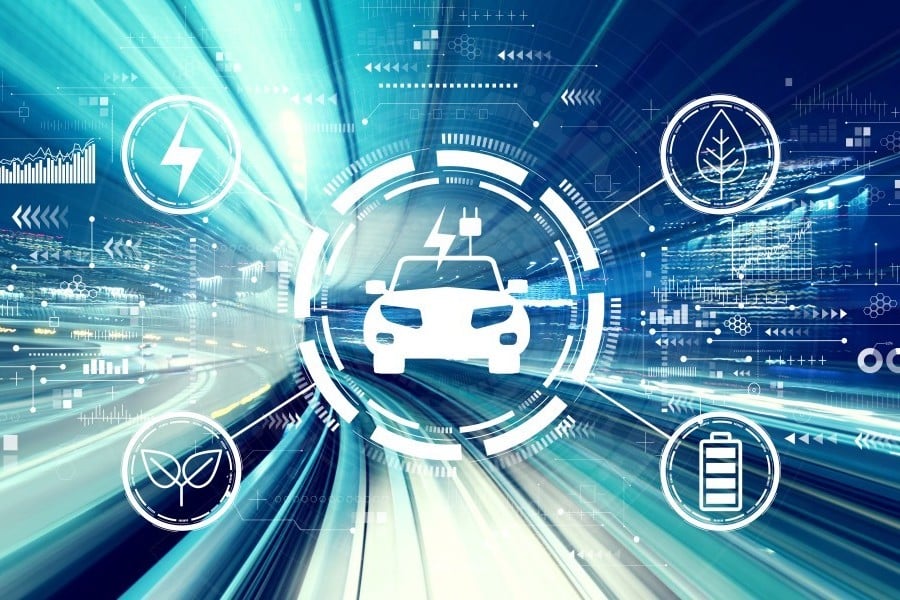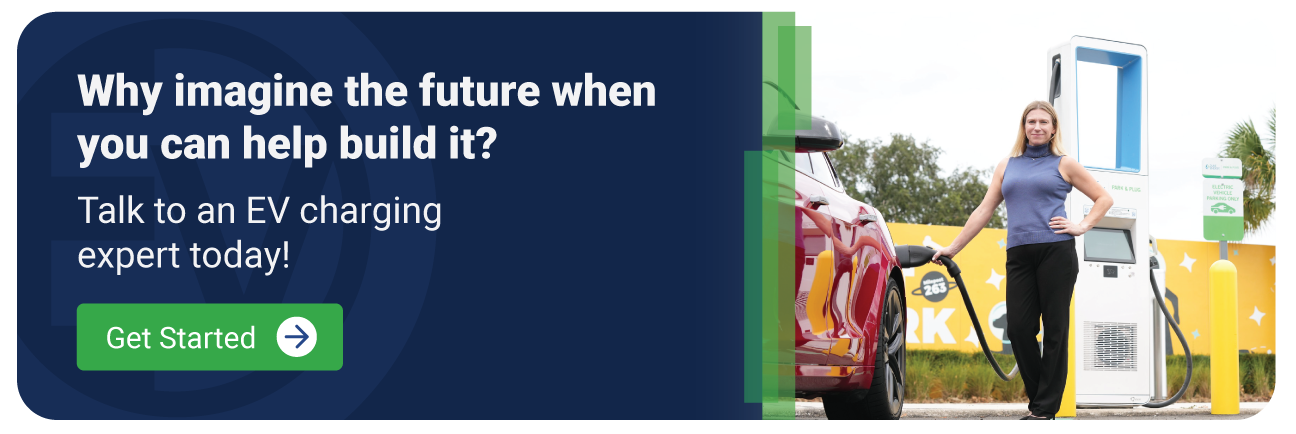Understanding Networked vs Non-Networked EV Charging Stations
Jun 19, 2023 | 7 MIN READ
 Just over a decade ago, anyone seeing an EV charging station in public might have wondered what it was. Thankfully, we’ve truly come a long way. These days, most folks recognize the familiar components of a charging station and now, as adoption increases and drivers grow more knowledgeable about the technology, everyone looking to capture the EV driver market, as customers, employees, residents, and more, is starting to learn more about EV charging as well. One of the most important elements of a charging station is not how, but if the station itself is networked.
Just over a decade ago, anyone seeing an EV charging station in public might have wondered what it was. Thankfully, we’ve truly come a long way. These days, most folks recognize the familiar components of a charging station and now, as adoption increases and drivers grow more knowledgeable about the technology, everyone looking to capture the EV driver market, as customers, employees, residents, and more, is starting to learn more about EV charging as well. One of the most important elements of a charging station is not how, but if the station itself is networked.
Quick Links
- Types of EV Charging Stations
- What is a Non-Networked EV Charging Station?
- What is a Networked EV Charging Station?
- Benefits of a Networked EV Charging Station
Types of EV Charging Stations
If you’ve been checking out EV charging stations in public places, you’ve likely noticed a lot of variation and we’re not just talking about the EV charging company. In fact, there’s likely a lot of visible differences among what’s out there. There are three primary visible differences between public EV charging stations.
Charging Method- In public settings, you’ll see both Level 2, fast DC chargers (also referred to as level 3), and combo chargers which offer both options. Level 2 charging stations maintain a much smaller profile whereas the other two require a larger housing or cabinet.
Charging Connectors- When it comes to connecting cars to the charging station, the charging method as well as make/model of the electric vehicle will determine the charging connector needed. Most vehicles use the J1772 connector for charging at Level 1 and Level 2 stations, DC fast chargers have three different connectors, depending on your car model.
EV Charging Provider/Network- There are a lot of EV charging companies out there and most charging stations will feature the name brand. Further, some of those charging stations run on closed networks.
Closed networks rely on proprietary communication protocols to communicate between the charging station and the network server. As a result, owners of closed network charging stations must use this proprietary network’s services and compliant hardware.That means they cannot switch networks and retain the same charging equipment, nor can they use electric vehicle supply equipment (EVSE) based on open standards. In short, owners/hosts and drivers are locked into using specific chargers and a specific network, in perpetuity (or until all equipment is replaced).
Unfortunately, that also means that as software and hardware evolves, that same equipment or network may struggle keeping up with the industry.
However, a good number of EV charging companies, like NovaCHARGE, use an open network.
Open networks use Open Charge Point Protocol (OCPP), an internationally recognized open-source application protocol designed to allow EV charging stations and portals from different vendors to communicate with each other. This allows the owners of compliant charging stations to connect to multiple open networks. Owners can run different open standards–based networking providers on the same piece of hardware without the need for significant upgrades to existing hardware. And, as one can imagine, this open platform means both charging stations and networks are well-positioned for agility and flexibility when it comes to industry changes.
While all of those variations are important, one big difference in charging stations that isn’t necessarily visible is whether the station is networked or non-networked.
What is a Non-Networked EV Charging Station?
Non-networked EV charging stations are standalone entities. That means they’re not connected to a larger network of charging stations or other infrastructure. As a result, no administration or management (or troubleshooting and repairs) can be handled remotely, which also includes assessing a fee for using that particular EV charging station. In other words, this may be a good choice if you’re looking to save some money on the charger itself, but it limits you just about everywhere else (and doesn’t save you on installation).
What is a Networked EV Charging Station?
Networked EV charging stations are connected to a larger network of charging stations and network infrastructure. That means that charging station owners can access their charging stations remotely using online tools accessed through a portal or EVSE network. In other words, they have greater visibility into charger performance and greater control over charger administration. However, that one difference also changes a lot of other aspects of the charging experience for host/owners and drivers alike.
Benefits of a Networked EV Charging Station
While non-networked chargers may be less expensive, that typically means only the charger. After those savings, the benefits of choosing a networked EV charging station far outweigh the alternative.
1. EV Charging Station Transparency and Control
We’ll keep talking about it until drivers stop lodging complaints about EV charging station reliability. Nearly 21% of drivers, in a recent study, reported having issues using a public charging station. While there are additional concerns about station scarcity, a networked EV charging station can provide a station owner or host full visibility into the performance of their station.
For example, with the NovaCHARGE ChargeUP charging platform management system, station owners can drill down into just about every aspect of their station and even set up alerts for any signs of trouble. Unlike competitors, ChargeUP provides real-time reporting so you always know if there’s an issue. The network not only allows you to reset or restart your station, but our solution also features our NovaBOT which can perform proactive maintenance monitoring further improving the reliability of your station.
Part of the visibility into the station also allows you unparalleled control. As we mentioned above, without the network, station owners and hosts can’t set pricing for charging. With a networked charging station, not only can you set pricing, but it’s dynamic.
With ChargeUP from NovaCHARGE, you can adjust pricing based on station demand, power usage, time of day, date, and more. So, not only are you realizing a new revenue stream, but you dictate the pricing for your station.
For example, let’s say you know your station or the area will be busy on a specific day. You can set pricing based on time, but you can also charge more when an electric vehicle stays plugged in beyond a full charge meaning you don’t lose money when a car isn’t charging. Similarly, if you want to set up some drivers with free charging time, you can control pricing based on the driver.
And, much like controlling pricing, you can almost manage power. The electric grid can only handle so much demand but that needn’t limit your chargers, or the number of cars that can charge. With networked stations, you can balance the demand for power across chargers, ensuring you never hit the load limit and still meet charging demand.
If there’s a charging station variable, with NovaCHARGE, you can see it and control it.
2. EV Charging Station ROI
Perhaps one of the biggest factors responsible for the scarcity concerns we noted above is the cost of EV charging stations and installations. While there are incentives and rebates out there for building EV charging infrastructure, the cost is still one that gives many decision makers pause. However, when you consider the possible ROI with a networked charging station, it’s the smarter choice.
The truth of the situation, though, is this: the installation of charging stations, regardless of whether they are networked or non-networked, is the same. While you may save money on the actual hardware, EV charging station installation will cost the same (and has a pretty vast range of costs depending on site needs and more). Working with an EV charging station company who can provide complete turnkey service from site inspection and installation to service and support is one great way to maximize your opportunity and minimize your costs.
So, the question really becomes: Do they differ on the ROI they deliver? Yes.
In fact, one of the biggest benefits that networked charging stations offer is the flexibility for revenue generation. As discussed above, networked EV charging stations allow station owners and hosts to determine pricing structures and fees including surge pricing and more. Simply being able to apply dynamic pricing to your charging station means more revenue per month. In fact, estimates suggest that depending on a variety of factors like location, volume, and pricing, stations can bring in anywhere from $2-12,000 per month.
Additionally, networked EV charging stations, using advanced tech, can deliver tailored content, like advertising, to station users and that opens up a new revenue stream for owners as well.
 3. EV Station Awareness and Reliability
3. EV Station Awareness and Reliability
EV drivers, especially those in the midst of a range anxiety panic, will first and foremost consult EV charging station maps. Without connectivity, your station won’t show up on the map. It’s that simple. If you want drivers to be able to find you without stumbling onto your station by chance (or habit if you’re lucky), then a networked EV charging station is the only choice.
In review, networked EV charging stations really create the flexibility and reliability the industry demands. On the driver side, they’d like assurance and confidence when pulling up to an EV charging station that it’s online and ready to charge. Hosts and owners want to know they’re getting a return on their investment and reaping the other benefits of charging stations like revenue generation, reputation boosts, increased occupancy at MDUs, retail locations, and office buildings and parks, hitting sustainability goals, and taking an active role in helping to decrease carbon emissions.
Of course, the charging station you choose depends on your needs and NovaCHARGE is here to help you every step of the way. With decades of industry experience and expertise, our team is ready to help you find the EV charging solution that lets you be a part of the rEVolution. Get in touch with us today and let’s talk!
